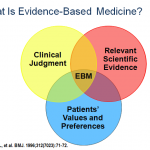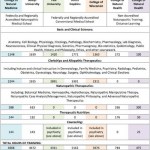evidence-based medicine
I’m always hesitant to write about matters that are more political than scientific or medical, although sometimes the sorts of topics that I blog about inevitably require it (e.g., the 21st Century Cures Act, an act that buys into the myth that to bring "cures" to patients faster we have to neuter the FDA and a retooled version of which is still being considered). This is one of those times. Yesterday, I woke up to the news that President-Elect Donald Trump had chosen Rep. Tom Price (R-GA) as his new Secretary of Health and Human Services. The Department of Health and Human Services (DHHS),…
There's a misconception that I frequently hear about evidence-based medicine (EBM), which can equally apply to science-based medicine (SBM). Actually, there are several, but they are related. These misconceptions include the idea that EBM/SBM guidelines are a straightjacket, that they are "cookbook medicine," and that EBM/SBM should be the be-all and end-all of how to practice clinical medicine. New readers might not be familiar with the difference between EBM and SBM, and here is not the place to explain the difference in detail because this post isn't primarily about that difference. The…
It's no secret that I'm a fan of John Ioannidis. (If you don't believe me, just type Ioannidis' name into the blog search box and see how many posts you find.) Over the last couple of decades, Ioannidis has arguably done more to reveal the shortcomings of the medical research enterprise that undergirds our treatments, revealing the weaknesses in the evidence base and how easily clinical trials can mislead, than any other researcher. Indeed, after reading what is Ioannidis' most famous article, "Why Most Published Research Findings Are False", back in 2005, I was hooked. I even used it for our…
I write about vaccines a lot here at Respectful Insolence, and for a very good reason. Of all the medical interventions devised by the brains of humans, arguably vaccines have saved more lives and prevented more disability than any other medical treatment. When it comes to infectious disease, vaccination is the ultimate in preventive medicine, at least for diseases for which vaccines can be developed. We also know that when vaccination rates fall, it opens the door for diseases once controlled to come roaring back. We saw this phenomenon with the measles a year ago in the Disneyland measles…
David Katz doesn't much like skeptics, particularly those of us who question the value of "integrative medicine." In fairness, I can't say that I much blame him. We have been very critical of his writings and talks over the years to my criticism of his statement advocating a "more fluid concept of evidence" more than once, to my pointing out that his arguments frequently boil down to a false dichotomy of either abandoning science or abandoning patients.
Last week, my friend Jann Bellamy discussed an unfortunate special supplement of the American Journal of Preventative Medicine (AJPM)…
I like to point out from time to time that arguably the most striking difference between science-based medicine (and the evidence-based medicine from which we distinguish it) and alternative medicine, "complementary and alternative medicine" (CAM), or (as it's called now) "integrative medicine" is a concerted effort to change practice for the better based on science and evidence. In other words, in SBM, we are continually doing studies to improve practice. These studies take on two general forms: Comparing new treatments with old to determine if the new treatments work better and, as has…
Regular readers of this blog will find it no surprise that I don't think much of Dr. Mehmet Oz. The reason, of course, is that his daily television show, The Dr. Oz Show, has been a font of misinformation about medicine almost since it began airing six years ago. It's not for nothing that I long ago labeled him "America's Quack." Simply searching for the name Mehmet Oz on this blog will quickly produce examples of the many times when he's credulously promoted quackery and pseudoscience such as homeopathy (The One Quackery To Rule Them All), faith healing, fear mongering about GMOs, and…
NOTE: Orac is on vacation recharging his Tarial cells and interacting with ion channel scientists, as a good computer should. In the meantime, he is rerunning oldies but goodies, classics, even. (OK, let's not get carried away.) Here's one from all the way back in 2007. Notice how, the more things change, the more they stay the same.
Evidence-based medicine is not perfect.
There, I've said it. Like anything else humans do in science or any other endeavor, evidence-based medicine (EBM) has its strengths and its weaknesses. On the whole, I consider it to be potentially vastly superior to the…
It often comes as a surprise to proponents of alternative medicine and critics of big pharma that I'm a big fan of John Ioannidis. Evidence of this can easily be found right here on this very blog just by entering Ioannidis' name into the search box. Indeed, my first post about an Ioannidis paper is nearly a decade old now. These posts were about one of Ioannidis' most famous papers, this one published in JAMA and entitled Contradicted and Initially Stronger Effects in Highly Cited Clinical Research. It was a study that suggested that at least 1/3 of highly cited clinical trials may either…
After I woke up this morning, the haze induced by feasting and hanging out with family only slowly clearing, I debated about whether I wanted to post anything at all today. After all, in much of the English-speaking world, it's still a holiday, Boxing Day. Although not an official holiday here in the US, when Christmas is on a Thursday, as it was this year, Boxing Day becomes an unofficial holiday that the majority of people not working in the retail sector seem to take off, the better to produce a four or five day weekend, depending upon whether they took Christmas Eve off as well. Also, it…
Well, Naturopathic Medicine Week 2014 (or, as I like to refer to it, Quackery Week) is fast drawing to a close; so I figured I’d end it with one last post. Since several of you liked my post a couple of days ago Sh*t naturopaths say and agreed with me when I suggested at the end that I ought to make this a recurring feature on the old blog here. So, how better to finish off Naturopathic Medicine Week 2014 than with another installment of Sh*t naturopaths say. In fact, I might even have to make it a tag. After all, I’m sure naturopaths will continue to provide me with quackery to deconstruct,…
Regular readers probably know that I'm into more than just science, skepticism, and promoting science-based medicine (SBM). (If they're regular readers of my other, not-so-super-secret other project, they might also realize that they've seen this post before elsewhere. I had to stay out late for a work-related event and decided to tart it up and recycle. So sue me.) I'm also into science fiction (hence the very name of this blog, not to mention the pseudonym I use), computers, and baseball, not to mention politics (at least more than average). That's why our recent election, coming as it did…
The Rise Of Marketing-Based Medicine
64 Comments
By Ed Silverman // January 28th, 2010 // 7:57 am
You've heard of evidence-based medicine. Well, a new paper summarizes a panoply of practices employed over the past two decades or so - ghostwriting, suppressing or spinning data, disease mongering and managing side effect perceptions among docs - that the authors call marketing-based medicine. And they rely on internal documents from litigation - such as the much-publicized lawsuits over antipsychotics and antidepressants - to illustrate their point.
A stunning must-read from Ed…
A roundup of wonderful stuff I won't get to. Then again, many of these need no help:
"Come tomorrow and sort this hell hole out. Dinner and drinks, 4 p.m. Bring wine and caviar only.". Woman emails party invitations while asleep. Hat tip: BoingBoing
Obviously, the drug and medical device industry is not looking forward to independent research that compares expensive new drugs or procedures to older and less expensive treatments. Alison Bass on objections to (and spirited attacks on) the stimulus bill's funding of comparative effectiveness studies -- a subject I hope to write more about soon…










